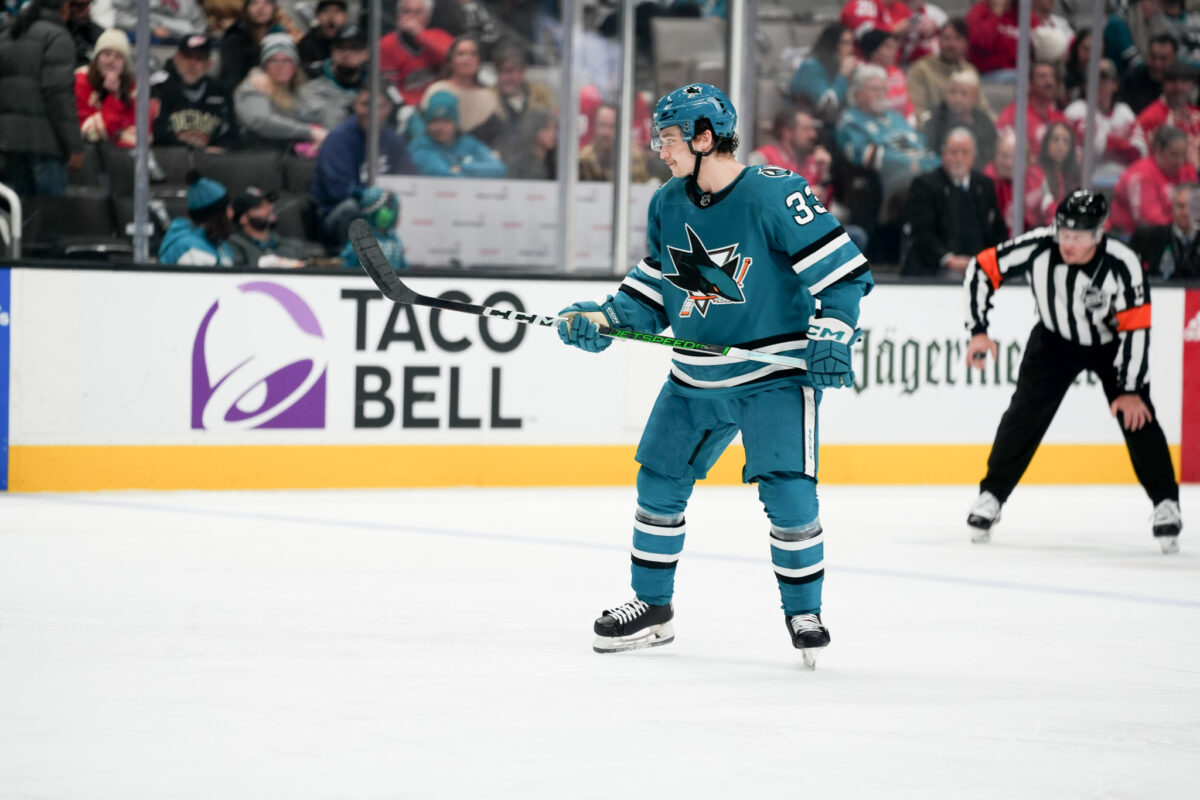The San Jose Sharks showed good fortitude on Saturday night (Feb. 24) against the Nashville Predators, but ultimately fell short in a 4-2 loss. They stayed competitive the whole way and had some strong sequences, but got outplayed for too much of the contest and took their third straight defeat. The game was also the latest example of San Jose’s skaters failing to properly support their goalie with their play, thanks to ailments that have plagued them — in one form or another — throughout the season.
Sharks Struggle in the Defensive Zone
One of the Sharks’ primary defensive challenges this season has been the frequency with which they allow breakaways and odd-man rushes. Against the Predators, however, the larger problem came on set plays in which Nashville had already established themselves in the San Jose zone.

The Predators spent much of the game dominating the puck, forcing the Sharks to play a defensive style for long stretches and outshooting them 35-25, which also prevented them from establishing any sort of flow on offense until the third period. Many of Nashville’s best looks at the net came not in transition, but in five-on-five sets in which the Sharks simply missed a defensive assignment and allowed a skater to come free. This included the opening goal when Calen Addison and Justin Bailey failed to communicate properly, and neither covered the ice right in front of the net, allowing Kiefer Sherwood to get a wide-open look that gave his team a 1-0 lead.
The Sharks’ ability to defend in transition has been problematic for basically the entire season. They were somewhat better at this than usual on Saturday night, but that’s hardly a consolation when the rest of the defense doesn’t come together.
Sharks’ Dysfunctional Power Play Creates Missed Opportunities
When the Sharks didn’t have much offense going in the first period, Nashville gave them a couple of chances to get on track by committing two penalties. The resulting power plays did nothing to fix these issues.
Related: Sharks’ Penalty Kill Looking to Turn a Corner
With the man advantage, the Sharks looked completely out of sorts. The puck movement wasn’t particularly crisp, and they didn’t get many good shots to the net. Their best chance by far came on a lucky bounce when the Predators’ penalty kill unit made a bad clearance attempt. They even allowed Nashville to create a couple of moderately dangerous shorthanded looks. And while it wasn’t a true power play, it is worth noting that their late-game six-on-five attempt yielded basically nothing in the way of a scoring chance, with the Predators actually controlling the puck for much of the duration before scoring an empty-net goal.
The San Jose power play has had its moments at various points during the season, but has never established a consistent rhythm. Saturday’s loss won’t do much to fix that.
Kahkonen Hurt by Lack of Offensive Support
Despite some excellent recent performances, Kaapo Kahkonen doesn’t see many wins when he gets in the net. The team in front of him hasn’t always been up to the task. Whether it’s a last-second defensive breakdown to allow the Columbus Blue Jackets to score a game-winning goal or being shut out by the Winnipeg Jets despite Kahkonen allowing just one goal, the Sharks have failed to give him the support he deserves on multiple occasions.
Saturday’s game wasn’t the extreme that the Jets loss provided, but there were certainly similarities. When the Sharks weren’t generating any offense in the first two periods, all the pressure was on Kahkonen to perform perfectly. He turned in another strong effort, but the defensive mistakes that led to the first goal left him unprotected. A penalty led to a power-play goal in the second period, and a two-goal deficit felt very difficult to overcome, given how badly the Sharks were struggling to score. These exact problems were a staple of the Sharks’ lowest moments of the season, and while this game was nowhere near those extremes, the parallels were obvious.
To San Jose’s credit, they did battle back and shrink the margin to one goal on two separate occasions. But once again, it wasn’t enough, and once again, they handed their goalie a loss that looked worse for him than it actually was.
